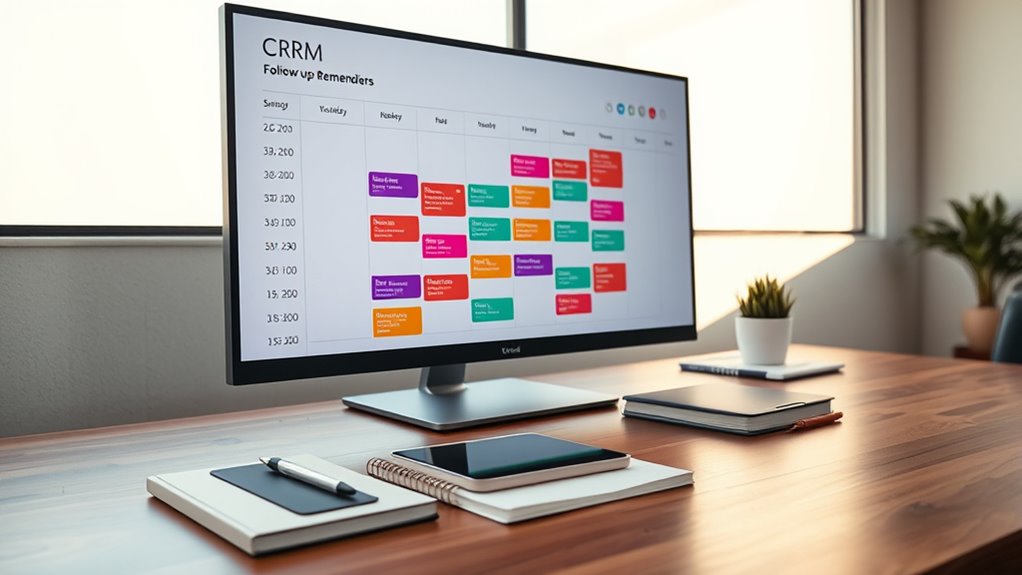To never miss a follow-up and close more deals, set up a well-structured CRM calendar that syncs with your email and scheduling apps. Automate reminders for each contact and use workflows to trigger follow-ups based on engagement. Regularly review your calendar analytics to optimize timing and strategies. By keeping everything centralized and automated, you’ll stay proactive and professional. Keep exploring to discover more tips on building an unbeatable CRM calendar that drives results.
Key Takeaways
- Integrate your CRM with email and calendar apps to centralize scheduling and ensure timely follow-ups.
- Automate reminders and follow-up tasks for consistent contact without manual effort.
- Use analytics to identify optimal contact times and refine follow-up intervals for higher engagement.
- Set automated triggers based on prospect interactions to maintain a proactive outreach strategy.
- Regularly review and adjust your calendar to improve scheduling effectiveness and close deals faster.

Are you making the most of your customer relationships? If not, it’s time to leverage a CRM calendar that keeps your follow-ups on track and your deals closing faster. A well-structured CRM calendar isn’t just about marking dates; it’s about creating a seamless system that automates your reminders and guarantees you never miss an opportunity. With sales automation tools integrated into your CRM, you can set up automatic alerts for follow-ups, meetings, or calls, freeing you from manual tracking and reducing the risk of human error. This way, every contact gets the attention it deserves without you having to remember every detail.
Calendar integration plays a vital role here. When your CRM syncs with your email and calendar apps, your schedule becomes a centralized hub. You can see all your appointments, deadlines, and follow-up tasks in one place. This eliminates the chaos of juggling multiple platforms and helps you maintain a clear overview of your pipeline. As soon as a prospect interacts with your outreach, your CRM can automatically schedule follow-up reminders, ensuring you stay engaged without delay. This seamless connection between your calendar and CRM boosts efficiency and helps you respond promptly, which is often the difference between closing a deal and losing a customer.
Creating a CRM calendar that works for you involves more than just inputting dates. It requires setting up automated workflows that trigger actions based on specific events. For example, if a client opens an email but doesn’t respond, your system can automatically schedule a follow-up call or email sequence. By automating these repetitive tasks, you conserve your time and focus on building relationships rather than managing schedules. Furthermore, understanding the importance of contrast ratio in visual presentation can help you design more effective visual aids within your CRM that highlight key follow-up dates and priorities, making your workflow more intuitive. Additionally, consistent follow-ups demonstrate professionalism and reliability, which are key to closing deals.
To maximize your CRM calendar’s potential, you should also regularly review and adjust your scheduling strategies. Use insights from your calendar analytics to identify patterns—such as the best times to reach clients or the most effective follow-up intervals—and refine your approach accordingly. This ongoing optimization ensures your sales process remains smooth and proactive. When your calendar is tightly integrated with your sales automation tools, you create a proactive environment where opportunities are seized at the right moment, turning prospects into loyal customers.
Frequently Asked Questions
How Do I Integrate My Existing Calendar With the CRM?
To integrate your existing calendar with your CRM, start by accessing your CRM’s settings and look for the calendar synchronization options. Connect your calendar app, such as Google Calendar or Outlook, by granting the necessary permissions. Once linked, you can seamlessly manage appointment scheduling, see updates in real-time, and guarantee your follow-ups aren’t missed. This integration streamlines your workflow and keeps all your scheduling aligned for better deal closures.
What Features Should I Look for in a CRM Calendar?
Think of a CRM calendar as your sales pipeline’s heartbeat. You want features like scheduling automation to automatically set follow-ups and reminders, so nothing slips through the cracks. Data synchronization is essential, keeping your calendar and CRM info aligned in real time. Look for a calendar that streamlines your workflow, reduces manual updates, and keeps your sales process smooth and on track, helping you close deals faster.
Can I Customize Follow-Up Reminders for Different Clients?
Yes, you can customize follow-up reminders for different clients. Look for CRM calendars that offer personalization options, allowing you to set tailored reminder frequencies based on each client’s needs. This way, you guarantee you stay engaged without overwhelming them. By adjusting the timing and content of reminders, you improve your follow-up effectiveness and build stronger relationships, ultimately closing more deals.
How Secure Is My Data Within the CRM Calendar?
Your data within the CRM calendar is highly secure because it employs data encryption to safeguard your information from unauthorized access. Additionally, access controls guarantee only authorized personnel can view or modify sensitive data. This combination keeps your client details safe and maintains your privacy. Rest assured, reputable CRM systems prioritize security, so your information stays protected while you focus on closing deals effectively.
Is Mobile Access Available for Managing the CRM Calendar?
Yes, mobile accessibility is available for managing your CRM calendar. You can easily access and update your calendar on your smartphone or tablet, ensuring you stay on top of follow-ups wherever you are. Plus, calendar synchronization keeps your data consistent across devices, so you won’t miss any important appointments or meetings. This seamless integration helps you stay organized and responsive, ultimately closing more deals efficiently.
Conclusion
Think of your CRM calendar as a trusted lighthouse guiding your deals safely to shore. Each follow-up is a beam of light, illuminating the path and preventing you from drifting into forgetfulness. When you consistently navigate with this beacon, your pipeline stays steady, and opportunities don’t slip away into the fog. Keep your lighthouse shining bright, and watch how your sales journey becomes smoother, more predictable, and ultimately, more successful.









